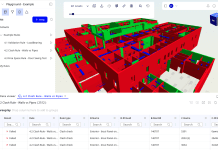Ineffective communication, planning and collaboration often result in construction projects that are delivered late, over budget and to inadequate quality standards. To overcome these challenges, the construction industry must find ways of working that allow them to deliver safe, fit-for-purpose projects faster and with fewer resources
The reasons for these inefficiencies are broadly common across the industry. According to a joint survey by the Institute of Civil Engineers (ICE) and ALLPLAN, incomplete data from different disciplines, design changes and problematic information exchange are highlighted as typical issues engineers face. The root cause of these problems is poor methods of communication among the project team. Without clear and transparent communication between all parties, the benefits of meticulous planning and collaboration cannot be realised.
The industry has been grappling with improving collaboration and overcoming a traditionally adversarial culture for some time. For example, in the UK, the landmark Latham Report in 1994 highlighted the need for enhanced teamwork and led to the development of the groundbreaking and collaborative New Engineering Council (NEC) 3 construction contract. Partnering, joint ventures and early contractor involvement have all emerged in order to foster a more integrated approach to construction, with some success. Yet despite this progress, construction productivity has continued to lag behind other sectors and has even declined in some areas.
Improved project outcomes
 Digitalisation has since made working together easier, with Building Information Modelling (BIM) driving real change throughout the industry. By providing a method of coordinating works, BIM has increased communication and collaboration and has improved project outcomes as a result. As integrated project information, effective communication and efficient design have become a reachable goal with BIM, it has become increasingly demanded by clients worldwide. However, the ICE survey results clearly show that there are still barriers to cooperation which are hindering progress.
Digitalisation has since made working together easier, with Building Information Modelling (BIM) driving real change throughout the industry. By providing a method of coordinating works, BIM has increased communication and collaboration and has improved project outcomes as a result. As integrated project information, effective communication and efficient design have become a reachable goal with BIM, it has become increasingly demanded by clients worldwide. However, the ICE survey results clearly show that there are still barriers to cooperation which are hindering progress.
Implementing BIM also comes with business complexities. Questions arise regarding information management and ownership, project management processes, technology implementation and training, financial implications, as well as how to successfully embed BIM within the company culture. Once the decision has been made to transition to BIM, there are issues regarding how to manage the coordination of works with internal and external parties, as well as the best way to collaborate.
OpenBIM enables interoperability
An openBIM solution can help overcome these barriers. OpenBIM is a vendor-neutral, collaborative process that uses open standards and workflows to facilitate interoperability. It results in enhanced collaboration by ensuring each party can use the software of their choice while still being able to share data with any BIM-compatible software. By using open, internationally recognised standards, the data that is shared between project teams is not partially lost due to file incompatibility. Instead, the model and the information it contains is shared in its entirety, so other disciplines can use it to inform their own work. Not only can better decisions be made, but less time is wasted finding or recreating information, improving efficiency.
A project collaboration platform can address the other issues that arise when implementing and using BIM. These tools ensure that any BIM implementation is successful by overcoming concerns about project management, information management, change management, coordination and collaboration. They allow project teams to share models and information in a transparent environment while retaining control. Data can be viewed in real-time, so the entire project team has access to the most up-to-date information when they need it.
Bimplus as an openBIM platform
 For example, ALLPLAN’s project collaboration platform, Allplan Bimplus, enables project teams to combine and visualise model data to identify clashes and manage design changes effectively.
For example, ALLPLAN’s project collaboration platform, Allplan Bimplus, enables project teams to combine and visualise model data to identify clashes and manage design changes effectively.
Any proposed changes can be visualised and compared before being confirmed, enabling informed decisions to be made earlier in the process. In turn, this reduces the risk of errors and discrepancies within the project and mitigates the impact of the changes. Bimplus uses an approval process workflow for sharing models based on the international ISO 19650 standard, so even global teams are working to the same standard of information management. The database structure used by Bimplus allows the platform to do more with the information, such as assign attributes and object information, and run clash detection checks or simulations. As an openBIM solution, information can be read by all the project participants irrespective of the file format used, ensuring no information is lost due to file incompatibility.
An openBIM project collaboration platform can hold the key to fully unlocking the potential of BIM. In a time when efficiency and productivity is imperative for successful project delivery, significantly enhancing collaboration among the project team is an essential requirement.
Please note: this is a commercial profile.





![[Video] Fireco: 80 new fire doors required for residential flats in London](https://www.pbctoday.co.uk/news/wp-content/uploads/2025/04/2024-06-01-Lords-view-one_1200x750_004-218x150.webp)








